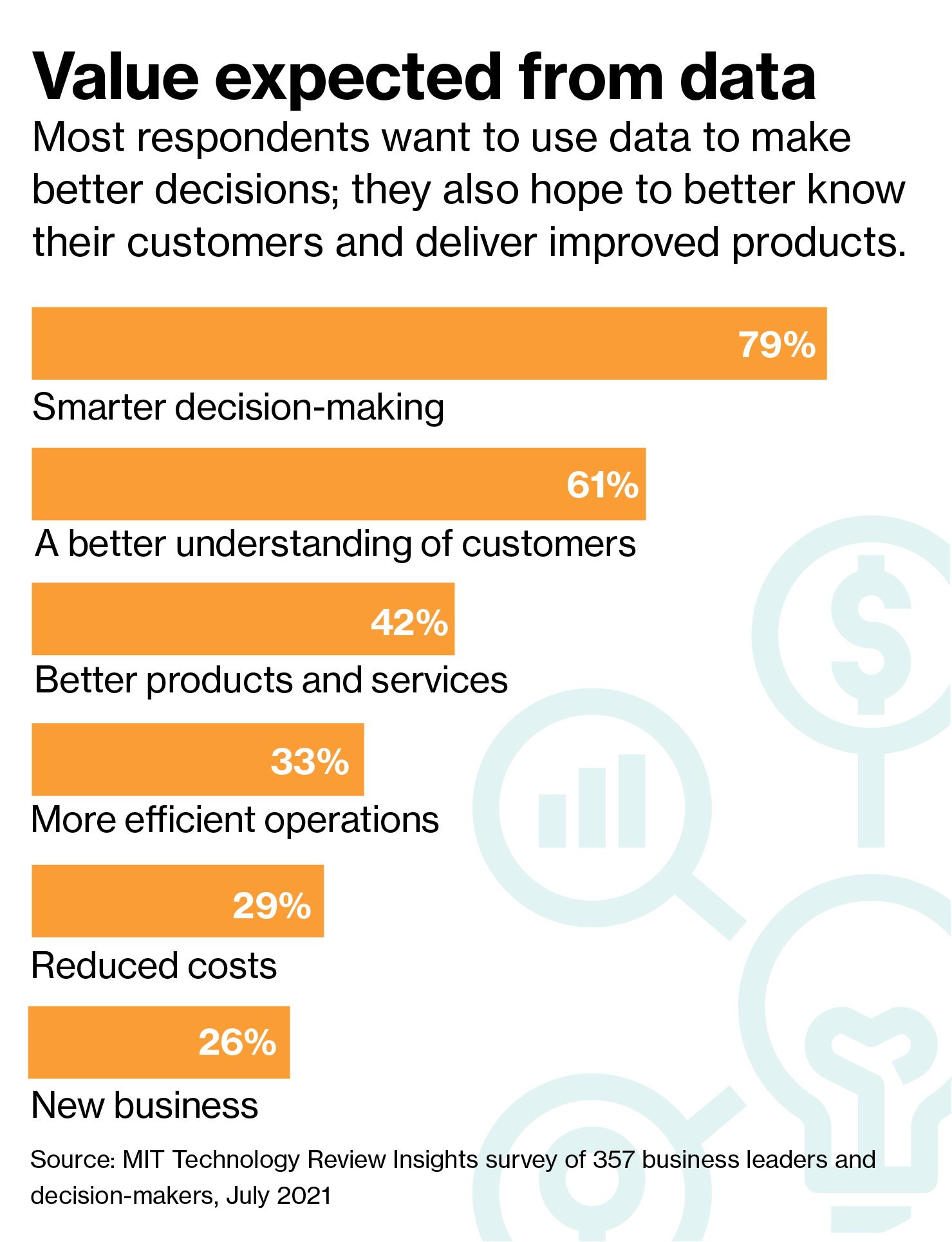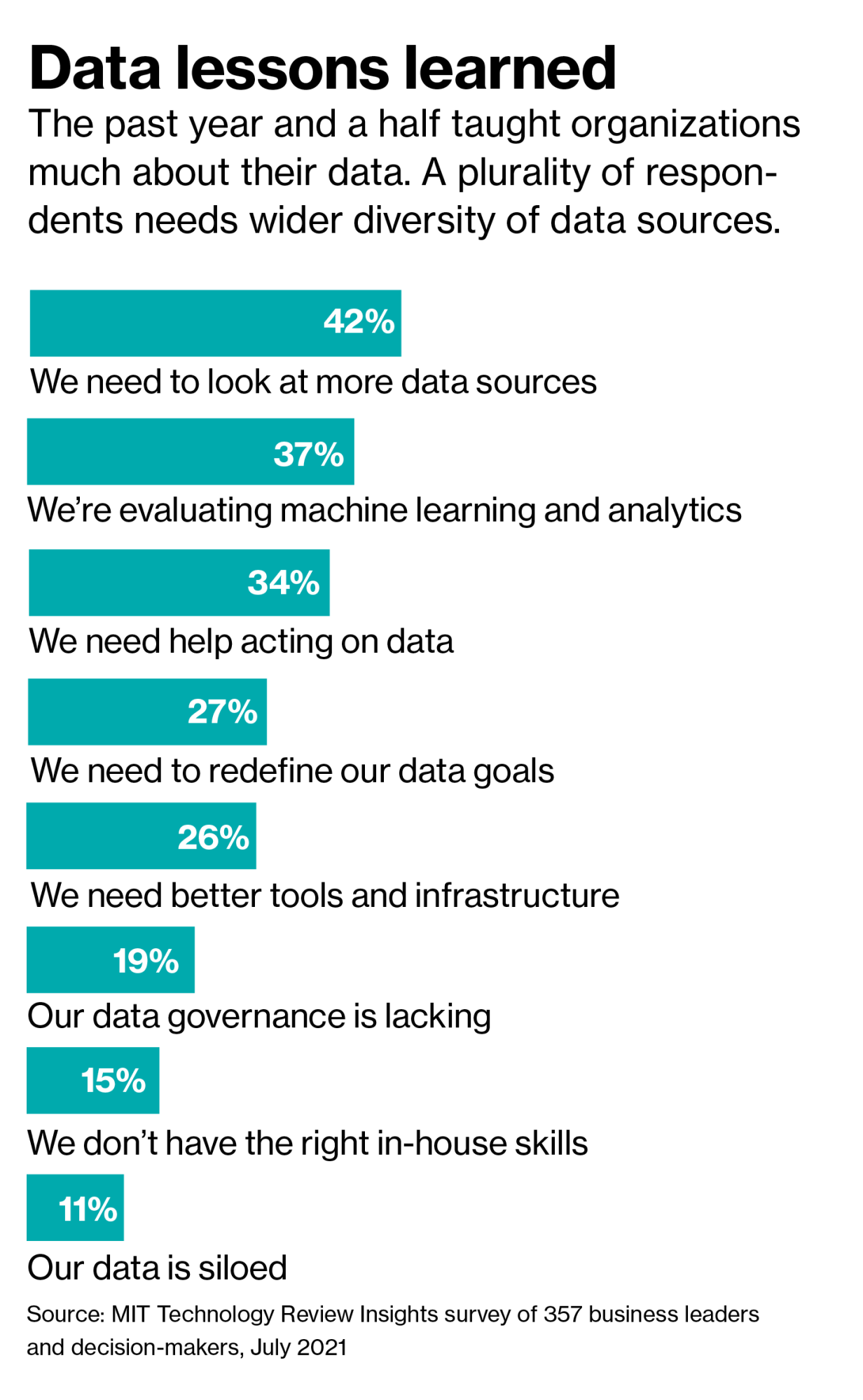In unpredictable times, a data strategy is key
More than 18 months after the 2020 coronavirus pandemic struck, it’s clear that the ability to make quick decisions based on high-quality data has become essential for business success. In an increasingly competitive and constantly shifting landscape, companies must be agile enough to tackle persistent challenges, ranging from cost-cutting and supply chain issues to product development and market shifts. Critical to thriving post-pandemic, say technology leaders and experts, is developing a long-term data strategy. That provides a strong foundation and clear vision which supports the organization’s ability to manage, access, analyze, and act on its data at scale to guide strategic business decisions.

“It’s an ongoing journey to get trustworthy data into the right people’s hands in a low-friction way,” says Jonathan Lutz, director of technology at Aquiline Capital Partners, a New York private equity company. The right data strategy is essential, he explains, particularly as an organization begins to scale its efforts. “There is an inflection point where manual processes are no longer tenable or sustainable,” he says.
A worldwide survey of 357 business executives, conducted by MIT Technology Review Insights and Amazon Web Services, shows that organizations of all sizes and across industries understand how crucial it is to become data-driven. Most important, they’ve learned that a supportive and successful data strategy cannot be left to chance.
Data value is front and center
The past year and a half were disruptive to businesses across industries, due in large part to the pandemic. The initial shutdowns in March 2020 meant that many companies had to turn on a dime to arrange for an all-remote workforce while also keeping up with wild shifts in consumer behavior and market demand.

The good news is, even during an unprecedented crisis, a large number of organizations continued to grow. In fact, nearly half of the survey respondents (45%) characterize their companies as “thrivers,” saying they boosted business growth over the past 18 months.
But, not surprisingly after such a challenging period, many other organizations could do little more than hold steady or try to hang on: the remaining 55% of those surveyed managed to maintain their efforts, conducting their usual level of business, or simply didn’t shut down.
Yet, whether organizations are thriving, maintaining, or just surviving, there’s no doubt that the power of data is top-of-mind for all businesses looking to succeed. In today’s digital world, companies gather or have access to vast amounts of data. Thanks to technologies such as cloud computing, analytics, and artificial intelligence (AI), they can also store, process, analyze, and put this treasure trove of data to use, in a meaningful way, to boost business outcomes.
As a result, there are many possibilities to gain business value from large data sets. According to the survey, the most common value companies are hoping to take advantage of is smarter decision-making (79%). They also want to more deeply understand their customers and industry trends (61%), provide better services and products (42%), and implement more efficient internal operations (33%).
Companies also learned valuable lessons about the importance of data as they struggled to stay competitive during the pandemic. Roughly four out of 10 survey respondents, for example, report that they need to look at more sources of data, including demographic, geospatial, and competitor information. More than a third (37%) are evaluating machine learning and analytics—technologies essential to extract critical insights from their data. And 34% need help acting on the vast sums of data they gather and process.

For Thermo Fisher Scientific, a US biotechnology company with more than 80,000 employees in 50 countries, thriving in today’s competitive life-sciences landscape is all about helping customers accelerate research, solve complex analytical challenges, improve patient diagnostics, and increase laboratory productivity. Through a scalable and secure platform on which researchers and scientists can collaborate, conduct research, and improve medical treatments, “we help our customers make the world healthier, cleaner, and safer,” says Mikael Graindorge, senior manager of commercial analytics and insight at Thermo Fisher. The company wants to provide the best service and products as well as the best ways for customers to efficiently complete their scientific research, he explains. “But to do that, we need more and more data, which means more complexity, so we need to expand our data science investment to continuously innovate for our customers.”
Data strategy is fundamental
These days, becoming data-driven is within the reach of every organization, says Ishit Vachhrajani, enterprise strategist at cloud provider Amazon Web Services. But it doesn’t happen overnight: having a sound data strategy, he says, is fundamental to support better decision-making and drive growth.
“Data strategy is table stakes in today’s world,” Vachhrajani says. “You can see the distance between companies that are moving fast and driving change on the journey towards a successful data strategy versus the companies that are lagging behind.”
Download the full report.
